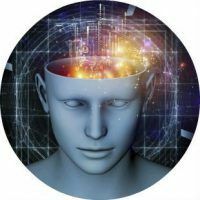
Sometimes there is a feeling that you have already been in a particular situation or you met someone who seemed to be a stranger or who was visiting a place, but you know for sure that you came there for the first time. This feeling people are already accustomed to call the effect of deja vu, but why this happens, no one can truly say, although there are many different versions and hypotheses on this score.
- Designation of the term
- Mystical view of
- Different interpretations of scientists
- Accumulated fatigue
- Memory malfunction
- Work of the subconscious
- Mental disorder
Designation of the term
Dejavu is also called a false memory, it is a distinct feeling that what is happening is repeated, and the situation in which youhave already been experienced before. But usually a person understands that what happened clearly happens to him for the first time. The very word deja vu translated from French means "already seen," for the first time this term was introduced by a psychologist from France Emile Boirec. Usually the effect lasts only a few seconds and disappears before a person has time to clearly understand what is happening to him.
Psychologists, physiologists and even metaphysicians are trying to give the logical justification for this phenomenon, but for several decades the final answer has not been forthcoming. The difficulty is that the cause of this phenomenon is in the work of the brain and cause a piece effect is impossible.
to contents ^Mystical view of
Most of the teachings indicate that the manifestation of this effect is nothing more than memories from past lives already lived. After reincarnation it sometimes happens that in similar situations the memories of two different lives overlap and this phenomenon manifests itself in the form of deja vu. It is believed that the effect is intended to indicate something in a new life, to influence a certain choice. It is also believed that the effect can simply be guarded like a sixth sense.
Different interpretations of scientists
Specialists from different fields, exploringso mysterious phenomenon, can not come to a common opinion. To date, there are several interpretations that explain the cause of this phenomenon, but there is no reliable evidence in favor of this or that one yet.
to the table of contents ^Accumulated fatigue
German psychologists have advanced the version that the cause of the deja vu effect is a strong body fatigue caused by stress and lack of sleep. The phenomenon is manifested by the fact that the brain areas responsible for consciousness and perception are not coordinated because of a malfunction.
to contents ^Failure in memory of
Physiologists say that the deja vu effect is manifested when a failure occurs in the temporal region of the brain. The hippocampus is responsible for comparing and comparing existing human memory with new information. Thanks to his work, we can compare and distinguish events occurring in the present tense and those that occurred in the past.
When a person sees a new place or object, another person analyzes the information from the hippocampus, it is compared with the previously obtained data already existing in the memory. If this part of the brain functions normally, then the person understands that new information is coming. But, if there was a failure and the seen immediately hit the center of memory without preliminary analysis, and after 1-2 seconds the error is eliminated and the hippocampus starts functioning normally, it immediately turns to the memory center. It turns out that the data got there, do not pass the analysis, the brain perceives as information that is already repeating, that is, it happened earlier. This is the reason for the occurrence of a false memory.
to contents ^Work of the subconscious
Some scientists, including Freud, consider the deja vu phenomenon to be the usual work of the subconscious, which at some point manifests its own defense mechanism. It means that memories of any situation were "hidden" by the human subconscious because they were unpleasant or even traumatic. But it happens that they "come back" under the influence of different factors and the situation seems familiar.
Mental disorder
Some specialists consider the effect of deja vu as a manifestation( symptom) of a mental disorder. Doctors are sure that a person besides deja vu suffers other mental ailments, and without proper treatment false memories will develop into prolonged hallucinations, under the influence of which the patient can harm himself or others.
On average, a normal, unaffected person experiences the effect once or twice a year.
